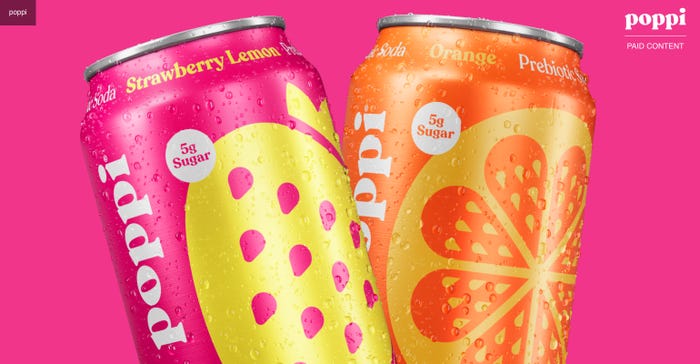October 31, 2024

With splashy television ads and boldly colorful cans sold seemingly everywhere, prebiotic sodas are all the rage. Positioned as gut-healthy, lower-calorie alternatives to sugary and diet sodas, these next-gen functional beverages have scored serious Gen Z cred while perking up the otherwise-sagging soda sector.
Case in point: Category leader Olipop landed on the most recent TIME100 Most Influential Companies list and is reportedly on pace to break $500 million in sales 2024, according to Bloomberg. The other big player, Poppi, bolstered by a “Shark Tank” investment, has achieved triple-digit growth in recent years, Food Dive reported in May. Both brands now boast glittery rosters of celeb investors and fans.
Yet marketplace disruption aside, are prebiotic sodas really, truly, legitimately good for you? Do they yield actual gut health benefits? Many shoppers are asking these questions, both online and at their favorite natural products stores, so we put our Secret Shopper to work. Here’s how one retailer fielded our questions.
Natural Foods Merchandiser: Are prebiotic sodas actually healthy for you?
Retailer: Yeah! I mean, look, drinking a can of Poppi or Olipop is not like eating an apple or a carrot. Whole foods will always be better for you. But I think these sodas are a great way to sneak a little extra fiber into your diet. Plus, they’re really delicious. And they’re definitely better for you than sugary sodas.
Natural Foods Merchandiser: That makes sense that they’re healthier than full-sugar sodas. But do they contain enough fiber—specifically prebiotic fiber—to legitimately benefit gut health? Or is there just a little bit of prebiotics sprinkled in to make these sodas more appealing to consumers?
Retailer: That’s a great question. But no, I think they really do have enough prebiotics to make a difference. I mean, every little bit helps, right?
How did this retailer do?

Danielle Crumble Smith, R.D., founder of Eat Well Live Well nutrition coaching
Our expert educator: Danielle Crumble Smith, R.D., founder of Eat Well Live Well nutrition coaching
Overall, the retailer seems to have a reasonable understanding of prebiotic sodas like Poppi and Olipop. However, there are some nuances and specifics that could benefit from further clarification and depth.
The retailer correctly identifies that whole foods are generally better than processed options like prebiotic sodas. This is a fundamental nutritional principle, as whole foods naturally contain a broad spectrum of nutrients and fiber in ratios that are typically more beneficial to health.
She also accurately notes that prebiotic sodas can be a more healthful alternative to sugary sodas, primarily due to their lower sugar content. That being said, it is still important to be mindful of overall sugar intake. It is recommended to not exceed 25 grams of added sugar per day, so multiple cans of prebiotic soda could result in exceeding that amount if you’re not being mindful.
Regarding fiber, while the retailer mentions that prebiotic sodas are a good way to get extra fiber, it's essential to note that the actual fiber content in these sodas can vary. Poppi contains about 2 grams while Olipop contains about 5 grams per can. For gut health benefits, it is recommended to get at least 3 to 5 grams of prebiotic fiber daily.
Also, saying “every bit helps” is an oversimplification, as the type of fiber and individual tolerance matter greatly. Introducing FODMAPs is crucial here. Not all fiber sources are created equal, especially for individuals with sensitive stomachs or conditions like irritable bowel syndrome. Prebiotic fibers, especially those sourced from inulin or FOS (fructo-oligosaccharides), can be high in FODMAPs and might cause distress in sensitive individuals.
For consumers interested in the gut health benefits of prebiotics, integrating a variety of fiber sources through a diet rich in fruits, vegetables, whole grains and legumes is advisable. Prebiotic sodas can complement this diet but should not be relied upon as the primary source of fiber or prebiotics.
Without a balanced diet, a prebiotic soda is not likely to provide much benefit as it pertains to gut health, especially if an individual is consuming a lot of refined carbs, simple sugars and processed foods, which negatively impact the gut microbiome. Consulting with a dietitian would provide more personalized and detailed guidance.
About the Author
You May Also Like
.png?width=700&auto=webp&quality=80&disable=upscale)



